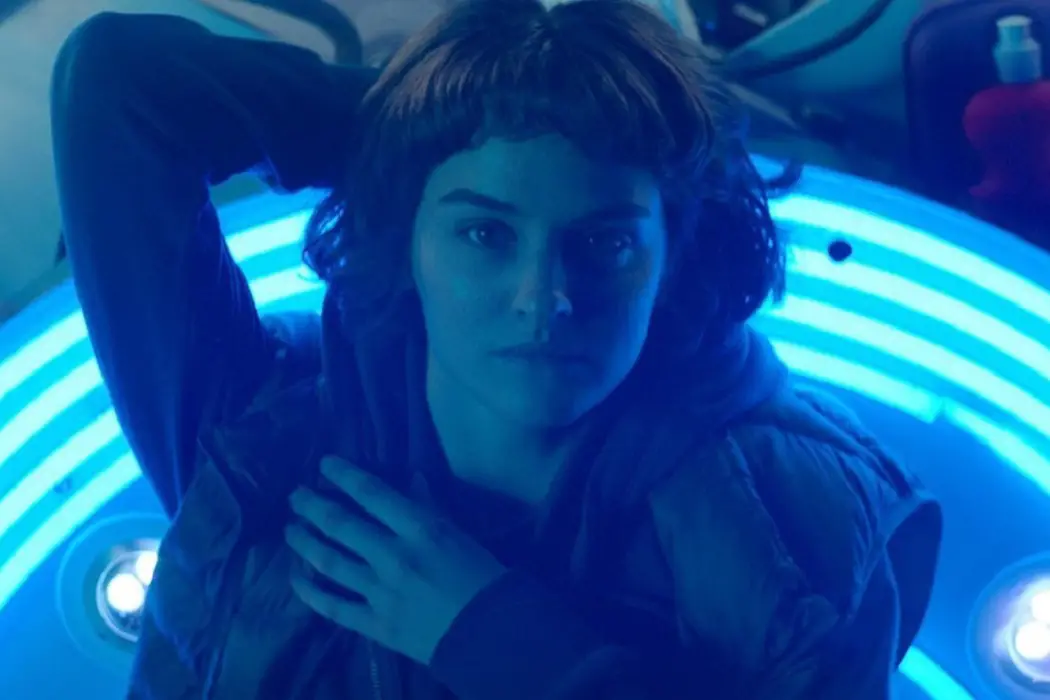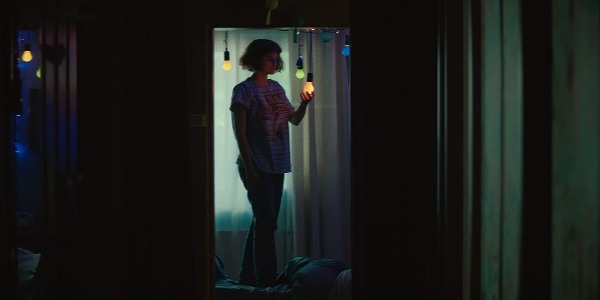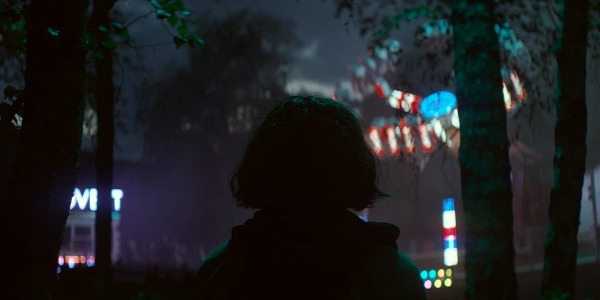Nightstream Film Festival 2020: JUMBO: Noémie Merlant Falls In Love With An Amusement Park Ride

Film critic, Ithaca College and University of St Andrews graduate,…
Jumbo will go down in film history, somewhat unfairly, as the movie in which Noémie Merlant f*cks an amusement park ride. The film, a French-Belgian co-production I saw at Nightstream’s Virtual Film Festival, has a funny premise, but there’s real pathos beneath that conceit, coaxed out by Merlant’s graceful performance and beautiful, measured direction from Zoé Wittock.
Those who bought tickets to see the woman-meets-ride romance won’t be disappointed. It’s the main attraction, after all — but Jumbo has more on its mind, including unconventional relationships in general, the female gaze, and a surprisingly nimble examination of the objectification of women.
All The Men Suck
Merlant plays Jeanne, a young woman who gets a night job at an amusement park she loved as a kid. She picks up trash and polishes the rides after closing, but one new attraction catches her eye. It’s the Move It ride, which she’s utterly entranced by and begins calling “Jumbo.” (Many critics refer to Jumbo as a Tilt-A-Whirl — it isn’t. Not only is a Move It, apparently, much different from a Tilt-A-Whirl, but these goofily named amusement park rides are manufactured and sold by completely separate companies. Who knew?!)
The film never tells us why Jeanne falls for Jumbo. But in the film’s world (much like our own), most of the men suck — like, they’re irredeemably awful. They either behave like rude children or creeps. So Jumbo already has a leg up.
The romance isn’t even that ridiculous, and Wittock’s script sets the table so perfectly that it hardly even registers as surreal. For Jeanne, inanimate objects aren’t so lifeless. An early scene, at a bus stop, finds Jeanne holding a rock to her ear, and she can faintly hear a heartbeat. We can imagine what she sees in Jumbo — perhaps she projects onto it her feelings of being an outsider, or maybe she’s comforted by how amusement park rides, unlike people, can’t be unfaithful, grow old, get sick, or die.

She lives at home with her mother, Margarette (Emmanuelle Bercot), who works as a waitress at the local diner. Margarette sleeps around and babies Jeanne, but she still hasn’t gotten over her divorce. Being the only stable person in Jeanne’s life, Margarette is the person whom Jeanne must win over and convince that what she and Jumbo have is real.
Portrait Of A Lady On Jumbo
Jeanne’s life, with just her and her mother, is defined by how insular it is; she’s very shy and rarely latches onto new people, instead preferring to spend free time in her bedroom, where she builds a miniature amusement park modeled after the one in town. There’s a throwaway line from Margarette about how Jeanne’s on the spectrum, but Wittock neither uses that as a catch-all or a disclaimer.
Instead, the detail adds depth to Jumbo and Merlant’s performance. This cutesy joke film about a woman falling in love with a Move It ride begins to channel real emotions: the c*cktail of joy, melancholy, and uncertainty that comes with a new love. The pain of your parents not accepting you for who you are. The isolation of not being able to connect with other people.
Whether Jumbo is really alive or simply exists in Jeanne’s head isn’t clear. But that question matters less and less as the film takes on these larger existential subjects until you realize that it hardly makes a difference if Jumbo is real because Jeanne’s feelings about it definitely are.
Wittock’s film champions an unconventional love story in the same way that Merlant’s breakthrough film, Céline Sciamma’s Portrait of a Lady on Fire, does. Neither film generates many conflicts between its two leads, instead of relying on outside forces to threaten their relationship. In both films, the romances are wholesome and sweet — small, soul-swelling examples of how perfect subversive relationships, however fleeting, can be.
Unlike Portrait, this film never asks Merlant to dig that deep, but Merlant is still the best thing about Jumbo. Her timid but passionate performance, as she nervously walks around the amusement park with her Amélie cropped hair, sells a story that shouldn’t read as anything short of absurd. Thomas Buelens‘ empathetic cinematography only furthers Merlant‘s performance, too, usually isolating Jeanne in the frame, in the dark, so we can understand how Jumbo ignites her world and makes her feel seen.
Soon enough, Jeanne approaches Jumbo with “Hey, you” and turns on the machine just to chat with it. And after Jumbo reciprocates her affections, you can apply erotic context to every action Jeanne takes — caressing its lights, climbing its steel pole… even the act of turning it on adopts an obvious sensuality.

At every juncture in their romance, Wittock finds a more artful, emotional, and playful way of illustrating their love — one scene in the shower, where Jeanne is covered in Jumbo’s black oil and frantically tries to scrub it off before her mother can see, feels private and panicky and maybe a little ashamed.
Their lovemaking scenes are equally gorgeous. When Jeanne takes Jumbo for a spin, we see her elation in a closeup, the film drawing a clear line between the thrill of an amusement park ride and the ecstasy of orgasm. They get a more satisfying, evocative sex scene, too, which manages to call to mind Under the Skin, of all things.
Gaze And Objectification
Amid all the fun and romance, Jumbo also manages to be a pretty clever dissection of gaze theory and the objectification of women. Film as an art form is still trying to break free of the male gaze and the white male control the medium has had since its inception.
But in films like Jumbo, we see an alternative — Merlant has nude scenes and sex scenes, sure, but the way they’re photographed is sensual rather than pornographic, exploratory rather than exploitative. The sole traditional hetero sex scene in the film is presented coldly and humorously, just two figures slapping meat off-screen for an uncomfortable length of time. Each scene with nudity and sexuality also has a clear narrative purpose and gives us insight into Jeanne rather than serving the filmmaker’s baser instincts or the need to viscerally satisfy an audience.
That Jeanne has fallen in love with a supposedly inanimate object also invites a critique of the male gaze, specifically how men in films directed by men tend to treat women as shiny, pretty objects to be ogled. Early in the film, Jeanne asks her boss, Marc (Bastien Bouillon), whether he’s ever loved an inanimate object. And he laughs it off, but the answer is obviously yes — or, at least, he’s fetishized them.
In a more conventional, scopophilic film, Jumbo’s two leads — Jeanne and the ride — would exist as little more than objects. Wittock gives them not only agency but sensual control.
Conclusion
There’s a scene in Jumbo where Jeanne takes a bath and imagines her Move It ride in the park at night, lights flashing and arms spinning. She repeats a phrase Marc told her like a mantra: “Inanimate objects, do you have a soul which sticks to our soul and forces it to love?”
Her hands glide over her chest, and she giggles and dips her head under the bubbles, one hand clutching the edge of the tub in perfect euphoria. That such a scene could make me hope that, somehow, these two get together by the end, despite the absurdity of its premise, is a sign of the power of Wittock’s direction and the thrilling discovery present in Merlant’s performance. The water splashes over the edge of the tub and cascades across the bathroom tiles, and the glee is infectious, wild, and deeply gratifying. In the wide loneliness of Jumbo’s world, Jeanne has found something that loves her for who she is, which she loves back just as openly.
Are you excited to see Jumbo? Or, if you’ve seen the film already, leave a comment below and let us know your thoughts!
Watch Jumbo
Does content like this matter to you?
Become a Member and support film journalism. Unlock access to all of Film Inquiry`s great articles. Join a community of like-minded readers who are passionate about cinema - get access to our private members Network, give back to independent filmmakers, and more.
Film critic, Ithaca College and University of St Andrews graduate, head of the "Paddington 2" fan club.













